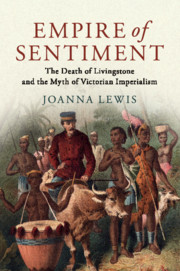
- Cited by 6
-
Cited byCrossref Citations
This Book has been cited by the following publications. This list is generated based on data provided by Crossref.
Hale, Matthew Raymond, Graham and Wright, Catherine 2019. List of publications on the economic and social history of Great Britain and Ireland published in 2018. The Economic History Review, Vol. 72, Issue. 4, p. 1451.
MacKenzie, John M. 2019. The Palgrave Encyclopedia of Imperialism and Anti-Imperialism. p. 1.
Rotberg, Robert I. 2019. His Brother’s Keeper: Charles Livingstone and the ‘Failure’ of David Livingstone’s Zambezi Expedition. The Journal of Imperial and Commonwealth History, Vol. 47, Issue. 1, p. 76.
MacKenzie, John M. 2021. The Palgrave Encyclopedia of Imperialism and Anti-Imperialism. p. 512.
Cuder-Domínguez, Pilar 2023. Decolonizing African and African Diasporan Cultural Memory in Djanet Sears and M. NourbeSe Philip’s Works. The Cambridge Journal of Postcolonial Literary Inquiry, Vol. 10, Issue. 3, p. 332.
Powell, Josh 2023. Fictions of depersonalization: inauthentic feeling at the fin-de-siècle . Nineteenth-Century Contexts, Vol. 45, Issue. 5, p. 429.
- Publisher:
- Cambridge University Press
- Online publication date:
- January 2018
- Print publication year:
- 2018
- Online ISBN:
- 9781108182591




